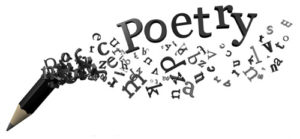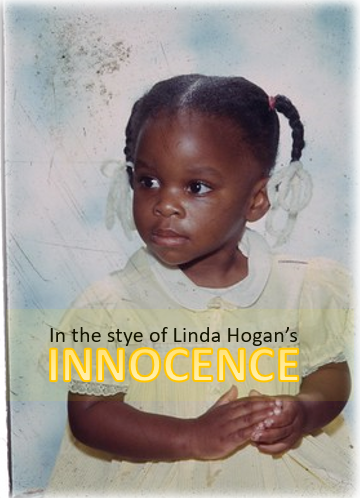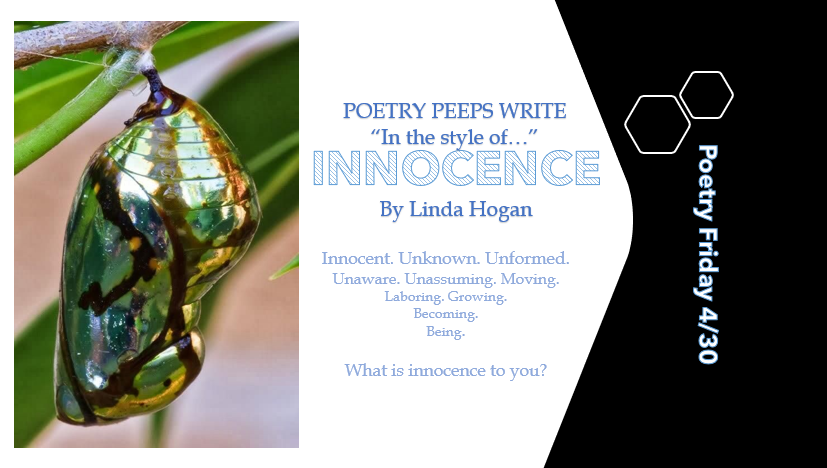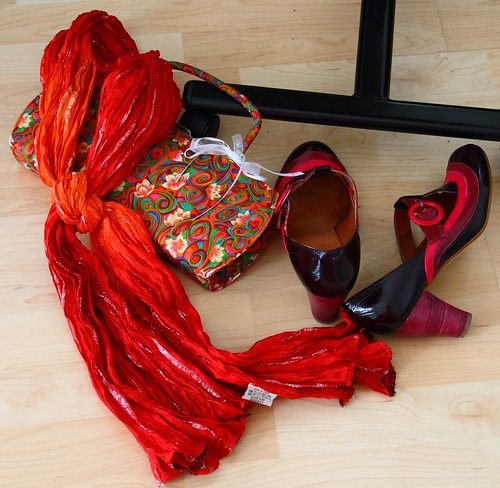Greetings! Welcome to another Poetry Peeps adventure on Poetry Friday!
You’re invited to try our challenge in the month of May! Here’s the plan: We’re going to write an ekphrastic poem using a photograph taken in a museum. We’re sharing a few amongst ourselves, but we’re sure you have some of your own – and it’s a great way to get us revved up about going back to museums! Interested? Good! You’ve got a month to craft your creation(s), then share your offering (or someone else’s) with the rest of us on May 28th in a post and/or on social media with the tag #PoetryPals.
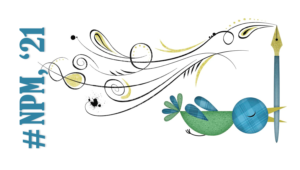
Andi challenged us with Linda Hogan’s poem, “Innocence“ this week, a fitting finish to the entire National Poetry Month celebration. We wanted to go out with a boom and boy was it a doozy. Here’s what Sara did with it. Kelly and Laura are taking a breather this week, but Tricia’s poem is here, Kelly’s is here, Liz’s is here. Andi’s is here. Check in throughout the day to find out what other Poetry Peeps have done. If you’d like more Poetry Friday content, Matt Forrest Esenwine is graciously hosting the roundup at Radio, Rhythm & Rhyme this week. Thanks, Matt!
“Innocence” is beautiful, deep and… utterly inimitable. It falls outside the usual topical sphere for my poetry, so I approached writing “in the style of” from a number of different angles. My Poetry Sisters all threw out their own recommendations, and I tried using haiku, then sijo, then mimicking Hogan’s topics – nature, growth – and her pattern of lines and syllables – 10-6-4. None of that really worked for me, so I set my attempts aside to really think about the title.
Contrary to all appearances, innocence is conceptually complicated, often a loaded concept for some growing up an ethnic minority, female, and/or religious. Some people are never embraced as innocent, witnessed by the number of girls sent home for dress code violations, as if they are only their bodies and are threat and distraction instead of children, or viewed askance because of early maturation, or even early pregnancies. Because there was so much – too much – swirling around a single word, I grounded innocence as far back as I could – to an image from childhood. This poem is based on one of my earliest memories, of watching my older sister at church, who was probably no more than five at the time, wearing what my envious sister eyes determined to be a fabulous yellow dress, standing up to recite with her class. (And yes: this is my sister, nearly five, in The Dress. Some fortymumble years later, I figure she won’t mind if I show her off. She looks the closest thing to a baby, yet I remember thinking she was oh, so grown-up then.)
How much of what we held in childhood do we keep? How do we navigate the passage between childhood certainties and adulthood’s intricacies? What does it mean to be young at heart, or have a child’s optimism and faith? I don’t know. I’m not entirely convinced I was able to go where I wanted to in this poem (you don’t want to know how many times I rearranged lines and fiddled), but as I wrestled with at the eleventh hour, I reminded myself – and you, too: the challenge isn’t perfection, but persistence. So, here we try again:
Be thou faithful unto death &
Is there anything more innocent
than an unformed soul clutching tight her crayoned crown,
as, words a wavering childish treble,
she recites revelation? ablaze with
purity, knowing neither faithfulness
nor death she
stands; stray sunbeam whitening a dress already luminous
proclaiming borrowed words, she is, personified,
a mother’s pride, transformed larger than life
in these two wondering eyes
We grew, wholesome as wheat, but I backward looking, linger to
wonder: who decodes such concepts as
faithfulness and faith? whose hand, holding keys to childhood certainties
points toward one door, while locking tight another? Perhaps
pushing past crowns and covenants, we all return at last
to merely human
a child, I watched, awaiting my turn, lips shaping
each confident consonant. Child-hearted now,
in uncertain innocence, I
claim my chance to choose my crown
